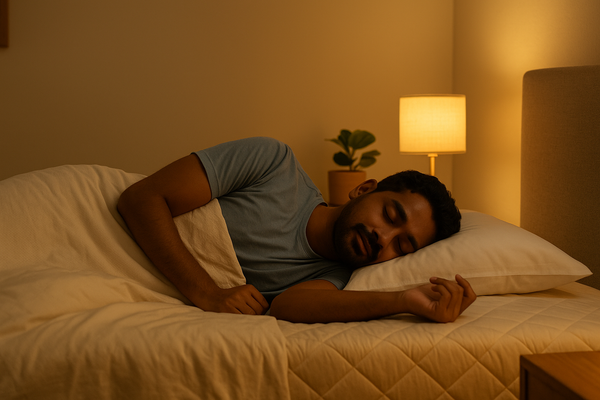Mood, Immunity, Memory: The Silent Benefits of Sleep You Can’t Afford to Ignore

Table of Contents
The Architecture of Sleep
Sleep and Mood: Why Rest Fuels Resilience
Sleep and Immunity: The Body’s Reset
Sleep and Memory: Sharpening the Mind
India’s Sleep Deficit: A Cultural Cost
Building Better Sleep Habits
FAQs
When you sleep, you are not simply resting. Your body is actively repairing and resetting itself. While most of us view it as the final checkbox at the end of a long day, modern science is clear, sleep is as fundamental to survival as food and water.
It goes beyond keeping fatigue at bay because sleep strengthens your immunity, regulates your moods, and sharpens your memory. Ignore it, and the costs are far higher than just dark circles.
The Architecture of Sleep
Did you know you sleep in cycles? Each roughly lasts about 90 minutes, with two broad categories: Non-Rapid Eye Movement (NREM) and Rapid Eye Movement (REM) sleep. Both play distinct roles in recovery.
NREM sleep is further classified into Stage 1,2, and 3.
- Light Sleep (NREM Stage 1 & 2): During these stages, your body slows down. Your heart rate and body temperature drop, preparing the body for deeper stages. Though light, it accounts for more than half of our total sleep.
- Deep Sleep (NREM Stage 3): this is the most restorative stage. The body repairs tissues, releases growth hormones, and strengthens the immune system. Deep sleep is crucial for waking up refreshed and resilient.
- REM Sleep: This is when you dream the most. The brain consolidates memories, regulates emotions, and fuels creativity. During REM, neural connections are strengthened, making it vital for learning and problem-solving.
Adults typically need 7–9 hours of sleep a night, with about 20–25% spent in REM and another 15–20% in deep sleep. Cut this short, and the brain and body lose out on critical repair work.

Sleep and Mood: Why Rest Fuels Resilience
Sleep deprivation and irritability go hand-in-hand. University of Pennsylvania researchers found that people who slept for only 4.5 hours a night for one week reported feeling more stressed, angry, sad, and mentally exhausted. When they returned to a normal sleep schedule, they reported a dramatic improvement in mood.
Other studies have found that even one night of restricted sleep (four to five hours) increased negative emotional responses to neutral pictures. That means frustration, anxiety, and anger are amplified, while the ability to feel joy or calm is muted.
In contrast, adequate and consistent sleep stabilizes mood swings and enhances resilience. REM sleep provides what neuroscientists call an “overnight therapy session,” allowing the brain to reprocess difficult memories without the sting of stress hormones.
Sleep and Immunity: The Body’s Reset
Think of sleep as the immune system’s reset button. During deep sleep, the body ramps up production of cytokines, proteins that help fight infection and inflammation.
The effects of skipping sleep are striking. A study by the University of California, San Francisco, found that people who averaged less than six hours of sleep were four times more likely to catch a cold than those sleeping more than seven hours.
During the COVID-19 pandemic, several reviews highlighted that poor sleep was linked to weaker vaccine response and higher susceptibility to infection. For India, a country where 60% of adults get less than six hours of rest, this is a public health red flag.
Sleep and Memory: Sharpening the Mind
Sleep isn’t just about storage, it’s about synthesis. During deep sleep, the hippocampus transfers information to the cortex for long-term storage. Without this, memories fade faster.
Various studies have shown that people who slept after learning a list of words, or a particular skill were able to recall them 20–40% more than those who stayed awake. In addition, REM sleep strengthens associative memory, the brain’s ability to connect ideas creatively. That’s why a lot of modern business coaching systems use rest and naps to spark insights.

India’s Sleep Deficit: A Cultural Cost
India is among the most sleep-deprived nations in the world. Surveys show that one in three urban Indians gets less than six hours of sleep on weekdays. Long commutes, late-night screen time, and the glamorization of hustle culture all contribute.
The consequences are not just personal, they’re economic. The RAND Corporation estimated that sleep deprivation costs India’s economy nearly $80 billion annually in lost productivity. That’s equivalent to 2.5% of GDP.
Building Better Sleep Habits

Improving sleep quality doesn’t require drastic change, just consistency and awareness.
- Prioritize regular sleep habits: Go to bed and wake up at the same time daily.
- Control light exposure: Morning sunlight boosts alertness; dim light at night signals the body to wind down.
- Create a sleep sanctuary: A supportive mattress, cool temperature, and minimal noise are non-negotiables.
- Limit stimulants: Caffeine and late-night screen time disrupt deep and REM sleep cycles.
Sleep may feel passive, but it’s the most active recovery process the body undertakes. It resets mood, arms the immune system, and cements memory, all while we’re unaware. Ignore it, and the costs pile up silently in burnout, illness, and forgetfulness.
FAQs









